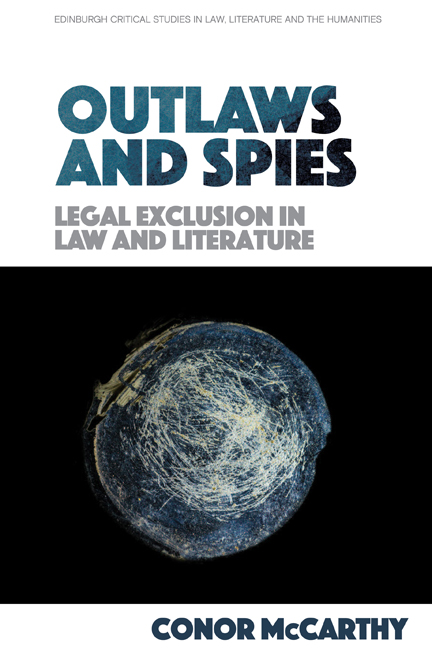Book contents
- Frontmatter
- Contents
- Acknowledgements
- Introduction
- 1 Outside the Law in the Middle Ages
- 2 Sovereign Outlaws: Shakespeare’s Second Tetralogy
- 3 The Endurance of Exclusion: Versions of Ned Kelly
- 4 ‘We’re Not Policemen’: Espionage and Law in John le Carré
- 5 ‘All Plots Tend to Move Deathward’: Plots and Consequences in Don DeLillo
- 6 Unanswered Questions: Ciaran Carson
- 7 Contesting the Virtual: William Gibson
- Conclusion
- Bibliography
- Index
2 - Sovereign Outlaws: Shakespeare’s Second Tetralogy
Published online by Cambridge University Press: 08 October 2020
- Frontmatter
- Contents
- Acknowledgements
- Introduction
- 1 Outside the Law in the Middle Ages
- 2 Sovereign Outlaws: Shakespeare’s Second Tetralogy
- 3 The Endurance of Exclusion: Versions of Ned Kelly
- 4 ‘We’re Not Policemen’: Espionage and Law in John le Carré
- 5 ‘All Plots Tend to Move Deathward’: Plots and Consequences in Don DeLillo
- 6 Unanswered Questions: Ciaran Carson
- 7 Contesting the Virtual: William Gibson
- Conclusion
- Bibliography
- Index
Summary
‘Oure maister is crowned of outlawe king’, Gamelyn is told when he takes to the forest, and, as we saw in the last chapter, there are a variety of outlaw kings to be found across medieval texts. Some, like the fictional Gamelyn or the factual Lionel, ‘king of the rout of raveners’, are almost carnivalesque: bandits exiled to the margins of society who parody royal authority as a means of challenging it. Others are leaders like William Wallace, who may have genuine claims to sovereign authority, but are reduced to the status of outlaws by the political use of legal exclusion. Despite their differences, all of these outlaw kings are to be found at the margins of power, the traditional location for the outlaw. The work of both Agamben and Derrida, however, suggests that exclusion from law exists not only at the margin, but also at the very centre of the state. This chapter, then, looks at the idea that the sovereign exists above or outside the law, and in doing so revisits the portrayals of embattled sovereignty in the second tetralogy of Shakespeare's history plays.
The King Outside the Law
In their discussions of sovereignty, both Derrida and Agamben focus upon the sovereign's power, in Derrida's words, ‘to give, to make, but also to suspend the law’. In doing so, each draws upon Carl Schmitt's definition of sovereignty: ‘sovereign is he who decides on the exception’. For Schmitt, this ability to decide on the exception, an ability that for him defines sovereignty, paradoxically places the sovereign both within and outside the legal system. ‘Although he stands outside the normally valid legal system’, Schmitt writes, the sovereign ‘nevertheless belongs to it, for it is he who must decide whether the constitution needs to be suspended in its entirety’.
The notion that the sovereign is above the law is both long-standing and surprisingly enduring. In The Politics, Aristotle suggests that men who surpass all others in their virtue and capacity for statecraft are akin to gods among men: there is no law that embraces them, for they are themselves law. He goes on to say that in democratic states, such men are likely to suffer ostracism and removal from the state, if their excess of wealth or power threatens the equality of others.
- Type
- Chapter
- Information
- Outlaws and SpiesLegal Exclusion in Law and Literature, pp. 55 - 79Publisher: Edinburgh University PressPrint publication year: 2020



